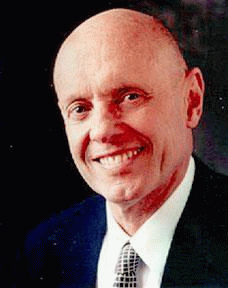|

|
 |
 |
 |
What sacrifices have you made to be where you are today?
I
have worked very hard to dedicate my personal and professional life to principle-centered living. I am driven by a passion
and conscience to spread understanding for principles and how to apply them to reach greatness. To that extent, there is no
sacrifice – only a passionate, relentless commitment to my work, family, community and church to make a lasting difference.
What in your opinion is the most important attribute of a leader and why?
I
believe the most important attribute for a leader is being principle-centered. Centering on principles that are universal
and timeless provides a foundation and compass to guide every decision and every act. I’ve based my life’s work
on promoting principles and teaching the power that resides in principle-centered leadership. Principles are not my invention;
they are self-evident and are found throughout the world. If you look at all enduring philosophies, religions and thoughts,
you will find principles such as integrity, compassion, trust, honesty, accountability and others at their core. I simply
translated these principles into a framework of habits, which when followed with consistency and frequency transforms one’s
character and allows one to earn the moral authority necessary for enduring leadership.
I must also clarify the definition
of leadership, which is sadly and narrowly defined as position, title, status or rank. This is formal authority and not necessarily
leadership. Through years of study, teaching and working with people all over the world, from all walks of life, I have determined
that leadership is: Communicating to people their worth and potential so clearly that they come to see it in themselves. It
is the influence we have with others to help them discover their own voice, to find their own purpose, to make their unique
contribution, and to release their potential, that truly defines leadership. Thus, leadership extends to the many personal
and professional roles we play – as workers, parents, children, teachers, students, swamis, you name it – and
the choice we make to live by principles to help others find their voice.
What leader do you really admire and why?
One immediate
leader who comes to mind is Muhammad Yunus, founder of the Grameen Bank. His story is one that illustrates the path to finding
one’s voice and helping others find theirs. Muhammad saw a need, felt his conscience move him to try and fill that need
and applied his talents and passion to fill it. In the process, he found his voice and helped others to find theirs.
What advice would you give youth who will become future leaders of tomorrow?
In
my 8th Habit book I share the idea that everyone chooses one of two roads in life, whether you’re older or younger,
man or woman, rich or poor. The most travelled road is the one that takes us to mediocrity and the other less travelled road
takes us to greatness and meaning. The first road limits us and prevents us from realizing our full potential. This road is
often the quick-fix or short-cut approach to life. It often lures us to it when we don’t take accountability for ourselves
or see ourselves as victims. My advice to the youth is to avoid the road of mediocrity. It’s probably hard for them
to see into the long term, but if they will try to see themselves as human beings with vast potential, and see that next to
life itself their greatest gift is choice – they can choose their responses to whatever comes to them in life, and take
responsibility for their choices, their behaviors, their feelings and choose to create their future.
Adapted and Modified from: November 2005 - ArriveNet
Editorials - Leadership Development Interview with Stephen Covey by Sharif Khan
Having
taught principle-centered leadership for over four decades, this living legend and world icon, with his quiet energy and grace,
epitomized a call to greatness and earned the respect of the audience -- standing as a grandfather figure for unleashing human
potential in many generations.
For
more information on Covey’s writings, please visit:
|
|
